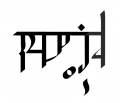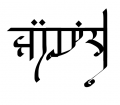Difference between revisions of "Hirgunya"
Trismegistus (talk | contribs) m |
Trismegistus (talk | contribs) |
||
| (4 intermediate revisions by the same user not shown) | |||
| Line 1: | Line 1: | ||
| − | Hirgunya is the common name for the ancient writing system used in late Kalaman Civilization that is the source of many modern writing systems. Hirgunya is an [http://en.wikipedia.org/wiki/Abugida abugida]. It is written from left to right. Hirgunya is the parent writing system for several other writing systems, including the Early [[Ithatian Syllabary]], the [[Midretassene Alphabet]], and the [[Erechórebese Alphabet]]. A late form of the Classical Hirgunya Abugida Script is still used today to write [[ | + | Hirgunya is the common name for the ancient writing system used in late Kalaman Civilization that is the source of many modern writing systems. Hirgunya is an [http://en.wikipedia.org/wiki/Abugida abugida]. It is written from left to right. Hirgunya is the parent writing system for several other writing systems, including the Early [[Ithatian Syllabary]], the [[Midretassene Alphabet]], and the [[Erechórebese Alphabet]]. A late form of the Classical Hirgunya Abugida Script is still used today to write [[Shardanian Language|Shardanian]] and [[Jaithan Language|Jaithan]]. |
| + | |||
| + | You can download the current ttf font [[http://wiki.worldofasdar.com/fonts/Hirgunya/ClassicalHirgunya.ttf here]] and the eot font [[http://wiki.worldofasdar.com/fonts/Hirgunya/ClassicalHirgunya.eot here]]. | ||
;Hirgunya | ;Hirgunya | ||
<span style="font-family:Hirgunya;font-size:200%"> </span> | <span style="font-family:Hirgunya;font-size:200%"> </span> | ||
| − | |||
| − | |||
=Hirgunya Script= | =Hirgunya Script= | ||
| Line 12: | Line 12: | ||
Prefictive S + Connecting Consonant + Stem + vowel or mute + diacritics (if any) + closure | Prefictive S + Connecting Consonant + Stem + vowel or mute + diacritics (if any) + closure | ||
| − | Most syllables in the | + | Most syllables in the Shardanian and Jaithan languages do not have all these components, but it is possible. In the word 'sklancha,' the first syllable 'sklan' has all five components, a prefictive s, a connecting consonant 'k,' a stem (liquid) 'l,' a diacritic (short, accented), and a closure 'N.' The 'cha' part of the word is the second and last syllable of the word 'sklancha.' |
The Hirgunya Script also has a character for the foreign sound 'll,' a voiceless lateral fricative which does not occur in Jathya-Dhumi languages. It was used to represent this foreign sound found in the [[Neptultchi Language]] and the [[Colnorian Language]]. | The Hirgunya Script also has a character for the foreign sound 'll,' a voiceless lateral fricative which does not occur in Jathya-Dhumi languages. It was used to represent this foreign sound found in the [[Neptultchi Language]] and the [[Colnorian Language]]. | ||
| Line 60: | Line 60: | ||
|<span style="font-family:Hirgunya;font-size:200%"> </span>|| /ʃ/ || ş, sh || RA + s || | |<span style="font-family:Hirgunya;font-size:200%"> </span>|| /ʃ/ || ş, sh || RA + s || | ||
|- | |- | ||
| − | | || /ʒ/ || z̧, zh || RA + z || | + | |<span style="font-family:Hirgunya;font-size:200%"> </span>|| /ʒ/ || z̧, zh || RA + z || |
|- | |- | ||
| − | | || /ɲ/ || ñ, ny || RA + n || | + | |<span style="font-family:Hirgunya;font-size:200%"> </span>|| /ɲ/ || ñ, ny || RA + n || |
|- | |- | ||
| − | | || /k/ || k || k || | + | |<span style="font-family:Hirgunya;font-size:200%"> </span>|| /k/ || k || k || |
|- | |- | ||
| − | | | + | |<span style="font-family:Hirgunya;font-size:200%"> </span>|| /g/ || g || g || |
|- | |- | ||
| − | | | + | |<span style="font-family:Hirgunya;font-size:200%"> </span>|| /kʰ/, /x/ || kh || RA + k || |
|- | |- | ||
| − | | || /gʰ/, /ɣ/ || gh || RA + g || | + | |<span style="font-family:Hirgunya;font-size:200%"> </span>|| /gʰ/, /ɣ/ || gh || RA + g || |
|- | |- | ||
| − | | || /ŋ/ || ǵ, ng || || | + | |<span style="font-family:Hirgunya;font-size:200%"> </span>|| /ŋ/ || ǵ, ng || || |
|- | |- | ||
| || || || || | | || || || || | ||
|- | |- | ||
| − | | || /kʃ/ || || k + sh (ligature) || | + | |<span style="font-family:Hirgunya;font-size:200%"> </span>|| /kʃ/ || || k + sh (ligature) || |
|- | |- | ||
| − | | || /pʃ/ || || p + sh (ligature) || | + | |<span style="font-family:Hirgunya;font-size:200%"> </span>|| /pʃ/ || || p + sh (ligature) || |
|- | |- | ||
| − | | || /nj/ || || n + y (ligature) || | + | |<span style="font-family:Hirgunya;font-size:200%"> </span>|| /nj/ || || n + y (ligature) || |
|- | |- | ||
| − | | || /lw/ || || l+w (ligature) || | + | |<span style="font-family:Hirgunya;font-size:200%"> </span>|| /lw/ || || l+w (ligature) || |
|- | |- | ||
| − | | || /lj/ || || l + y (ligature) || | + | |<span style="font-family:Hirgunya;font-size:200%"> </span>|| /lj/ || || l + y (ligature) || |
|- | |- | ||
| − | | || /gj/ || || g + y (ligature) || | + | |<span style="font-family:Hirgunya;font-size:200%"> </span>|| /gj/ || || g + y (ligature) || |
|- | |- | ||
| − | | || /ghj/ || || gh + y (ligature) || | + | |<span style="font-family:Hirgunya;font-size:200%"> </span>|| /ghj/ || || gh + y (ligature) || |
|- | |- | ||
| || || || || | | || || || || | ||
| Line 94: | Line 94: | ||
| || || || || | | || || || || | ||
|- | |- | ||
| − | | || /s/ || || prefictive s || | + | |<span style="font-family:Hirgunya;font-size:200%"></span>|| /s/ || || prefictive s || |
|- | |- | ||
| − | | || /w/ || || w (stem) || | + | |<span style="font-family:Hirgunya;font-size:200%"> </span>|| /w/ || || w (stem) || |
|- | |- | ||
| − | | || /y/ || || y || | + | |<span style="font-family:Hirgunya;font-size:200%"> </span>|| /y/ || || y || |
|- | |- | ||
| − | | | + | |<span style="font-family:Hirgunya;font-size:200%"> </span>|| /r/ || || r || |
|- | |- | ||
| − | | , | + | |<span style="font-family:Hirgunya;font-size:200%"> , </span>|| /l/ || || l || |
|- | |- | ||
| − | | || /ʔ/ || || a || | + | |<span style="font-family:Hirgunya;font-size:200%"></span>|| /ʔ/ || || a || |
|- | |- | ||
| − | | , || /h/ || || h || | + | |<span style="font-family:Hirgunya;font-size:200%"> , </span>|| /h/ || || h || |
|- | |- | ||
| − | | || /hw/ || || hw || | + | |<span style="font-family:Hirgunya;font-size:200%"> </span>|| /hw/ || || hw || |
|- | |- | ||
| − | | || || || high mark || | + | |<span style="font-family:Hirgunya;font-size:200%"></span>|| || || high mark || |
|- | |- | ||
| − | | || /N/, /n/, /m/, /ŋ/ || || || closure nasal | + | |<span style="font-family:Hirgunya;font-size:200%"></span>|| /N/, /n/, /m/, /ŋ/ || || || closure nasal |
|- | |- | ||
| − | | | + | |<span style="font-family:Hirgunya;font-size:200%"></span>|| /r/ || || || closure r |
|- | |- | ||
| − | | || /l/ || || || closure l | + | |<span style="font-family:Hirgunya;font-size:200%"> </span>|| /l/ || || || closure l |
|- | |- | ||
| − | | || /h/ || || || closure h | + | |<span style="font-family:Hirgunya;font-size:200%"></span>|| /h/ || || || closure h |
|- | |- | ||
| || || || || | | || || || || | ||
| Line 124: | Line 124: | ||
| || || || || | | || || || || | ||
|- | |- | ||
| − | | || || || null final || | + | |<span style="font-family:Hirgunya;font-size:200%"></span>|| || || null final || |
|- | |- | ||
| − | | || /ʔ/, / / || || || syllable begins with ' (usu. foreign) or vowel | + | |<span style="font-family:Hirgunya;font-size:200%"> </span>|| /ʔ/, / / || || || syllable begins with ' (usu. foreign) or vowel |
|- | |- | ||
| || /a/, /ɑ/ || || || default vocalic value of consonants + stem | | || /a/, /ɑ/ || || || default vocalic value of consonants + stem | ||
|- | |- | ||
| − | | || /ɪ/, /i/ || i || i || | + | |<span style="font-family:Hirgunya;font-size:200%"> </span>|| /ɪ/, /i/ || i || i || |
|- | |- | ||
| − | | , || /ʊ/, /u/ || u || u || | + | |<span style="font-family:Hirgunya;font-size:200%"> , </span>|| /ʊ/, /u/ || u || u || |
|- | |- | ||
| − | | || /ɛ/, /e/ || e || e || | + | |<span style="font-family:Hirgunya;font-size:200%"> </span>|| /ɛ/, /e/ || e || e || |
|- | |- | ||
| − | | || /ɔ/, /o/ || o || o || | + | |<span style="font-family:Hirgunya;font-size:200%"> </span>|| /ɔ/, /o/ || o || o || |
|- | |- | ||
| − | | || /ə/ || || RA + e || | + | |<span style="font-family:Hirgunya;font-size:200%"> </span>|| /ə/ || || RA + e || |
|- | |- | ||
| − | | || /aɪ/ || ai || || | + | |<span style="font-family:Hirgunya;font-size:200%"> </span>|| /aɪ/ || ai || || |
|- | |- | ||
| − | | || /aʊ/ || au || || | + | |<span style="font-family:Hirgunya;font-size:200%"> </span>|| /aʊ/ || au || || |
|- | |- | ||
| − | | || /ɛɪ/ || ei || || | + | |<span style="font-family:Hirgunya;font-size:200%"> </span>|| /ɛɪ/ || ei || || |
|- | |- | ||
| − | | || || || || muted consonant | + | |<span style="font-family:Hirgunya;font-size:200%"></span>|| || || || muted consonant |
|- | |- | ||
| || || || || | | || || || || | ||
| Line 152: | Line 152: | ||
| || || unmarked, unaccented, not geminate || || | | || || unmarked, unaccented, not geminate || || | ||
|- | |- | ||
| − | | || || unaccented, long || || | + | |<span style="font-family:Hirgunya;font-size:200%"></span>|| || unaccented, long || || |
|- | |- | ||
| − | | | + | |<span style="font-family:Hirgunya;font-size:200%"> </span>|| || accented, short || || |
|- | |- | ||
| − | | | + | |<span style="font-family:Hirgunya;font-size:200%"></span>|| || accented, long || || |
|- | |- | ||
| − | | || || geminate, unaccented, short || || | + | |<span style="font-family:Hirgunya;font-size:200%"></span>|| || geminate, unaccented, short || || |
|- | |- | ||
| − | | || || geminate, unaccented, long || || | + | |<span style="font-family:Hirgunya;font-size:200%"></span>|| || geminate, unaccented, long || || |
|- | |- | ||
| − | | | + | |<span style="font-family:Hirgunya;font-size:200%"> </span>|| || geminate, accented, short || || |
|- | |- | ||
| − | | || || geminate, accented, long || || | + | |<span style="font-family:Hirgunya;font-size:200%"></span>|| || geminate, accented, long || || |
|} | |} | ||
| Line 172: | Line 172: | ||
File:HirgunyaScriptAarothkopshaz.png|[[Aarothkopshaz]], the planet [[Orion Pharaonicus]] | File:HirgunyaScriptAarothkopshaz.png|[[Aarothkopshaz]], the planet [[Orion Pharaonicus]] | ||
File:HirgunyaScriptAturyanda.png|[[Aturyanda]] | File:HirgunyaScriptAturyanda.png|[[Aturyanda]] | ||
| − | File:HirgunyaScriptAturoksha.png|[[ | + | File:HirgunyaScriptAturoksha.png|[[Aturoksha]] |
File:HirgunyaScriptBhimala.png|[[Bhimala]], the god Vimal and the lake Vimala | File:HirgunyaScriptBhimala.png|[[Bhimala]], the god Vimal and the lake Vimala | ||
Latest revision as of 14:50, 23 August 2020
Hirgunya is the common name for the ancient writing system used in late Kalaman Civilization that is the source of many modern writing systems. Hirgunya is an abugida. It is written from left to right. Hirgunya is the parent writing system for several other writing systems, including the Early Ithatian Syllabary, the Midretassene Alphabet, and the Erechórebese Alphabet. A late form of the Classical Hirgunya Abugida Script is still used today to write Shardanian and Jaithan.
You can download the current ttf font [here] and the eot font [here].
- Hirgunya
Hirgunya Script
The Hirgunya Abugida represents syllabic utterances. Special forms indicate the final character of a word. A syllable in Hirgunya can potentially consist of the following components in the following order:
Prefictive S + Connecting Consonant + Stem + vowel or mute + diacritics (if any) + closure
Most syllables in the Shardanian and Jaithan languages do not have all these components, but it is possible. In the word 'sklancha,' the first syllable 'sklan' has all five components, a prefictive s, a connecting consonant 'k,' a stem (liquid) 'l,' a diacritic (short, accented), and a closure 'N.' The 'cha' part of the word is the second and last syllable of the word 'sklancha.'
The Hirgunya Script also has a character for the foreign sound 'll,' a voiceless lateral fricative which does not occur in Jathya-Dhumi languages. It was used to represent this foreign sound found in the Neptultchi Language and the Colnorian Language.
Hirgunya Abugida Table
If the Hirgunya font is not installed, you will see squares instead of the abugida characters (glyphs).
| HIRGUNYA GLYPH | IPA | Transliteration | Keyboard Input | Unicodes |
|---|---|---|---|---|
| | /p/ | p | p | |
| | /b/ | b | b | |
| | /pʰ/, /f/ | ph | f | |
| | /bʰ/, /v/ | bh | v | |
| | /m/ | m | m | |
| | /tʰ/, /θ/ | th | q | |
| | /dʰ/, /ð/ | dh | RA + q | |
| | /t/ | t | t | |
| | /d/ | d | d | |
| | /s/ | s | s | |
| | /z/ | z | z | |
| | /ɬ/ | ll, xh, x̧ | x | used for foreign sounds |
| | /n/ | n | n | |
| | /ʧ/ | ç, ch | c | |
| | /ʤ/ | j | j | |
| | /ʧʰ/ | çh, cch | RA + c | |
| | /ʤʰ/ | jh | RA + j | |
| | /ʃ/ | ş, sh | RA + s | |
| | /ʒ/ | z̧, zh | RA + z | |
| | /ɲ/ | ñ, ny | RA + n | |
| | /k/ | k | k | |
| | /g/ | g | g | |
| | /kʰ/, /x/ | kh | RA + k | |
| | /gʰ/, /ɣ/ | gh | RA + g | |
| | /ŋ/ | ǵ, ng | ||
| | /kʃ/ | k + sh (ligature) | ||
| | /pʃ/ | p + sh (ligature) | ||
| | /nj/ | n + y (ligature) | ||
| | /lw/ | l+w (ligature) | ||
| | /lj/ | l + y (ligature) | ||
| | /gj/ | g + y (ligature) | ||
| | /ghj/ | gh + y (ligature) | ||
| | /s/ | prefictive s | ||
| | /w/ | w (stem) | ||
| | /y/ | y | ||
| | /r/ | r | ||
| , | /l/ | l | ||
| | /ʔ/ | a | ||
| , | /h/ | h | ||
| | /hw/ | hw | ||
| | high mark | |||
| | /N/, /n/, /m/, /ŋ/ | closure nasal | ||
| | /r/ | closure r | ||
| | /l/ | closure l | ||
| | /h/ | closure h | ||
| | null final | |||
| | /ʔ/, / / | syllable begins with ' (usu. foreign) or vowel | ||
| /a/, /ɑ/ | default vocalic value of consonants + stem | |||
| | /ɪ/, /i/ | i | i | |
| , | /ʊ/, /u/ | u | u | |
| | /ɛ/, /e/ | e | e | |
| | /ɔ/, /o/ | o | o | |
| | /ə/ | RA + e | ||
| | /aɪ/ | ai | ||
| | /aʊ/ | au | ||
| | /ɛɪ/ | ei | ||
| | muted consonant | |||
| unmarked, unaccented, not geminate | ||||
| | unaccented, long | |||
| | accented, short | |||
| | accented, long | |||
| | geminate, unaccented, short | |||
| | geminate, unaccented, long | |||
| | geminate, accented, short | |||
| | geminate, accented, long |
Hirgunya Script Renderings
Aarothkopshaz, the planet Orion Pharaonicus
Bhimala, the god Vimal and the lake Vimala
Bhimaloksha, ancient Vimaluna
bimbhari, a native tree of Corundy
See Also
| This article is a stub. It requires further development by the creator. |



















